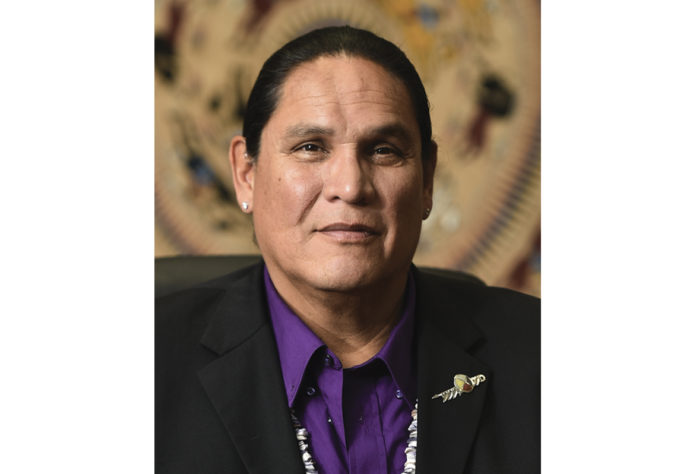by Ernest L. Stevens, Jr.
The Indian Gaming Association is preparing for our 22nd annual Summer Legislative Summit in Washington, D.C. as the midterm elections draw near. With limited legislative days remaining before the close of the 117th Congress, we have much to celebrate and so much more work ahead.
For more than two decades now, the Indian Gaming Association’s Winter and Summer Legislative Summits have empowered Indian Country and helped advance our voice on Capitol Hill. Since 2001, our legislative summits have brought federal policymakers together with tribal leaders nationwide to discuss priorities facing Native communities. Our summits educate Members of Congress and agency officials about the benefits of Indian gaming, highlight the importance of protecting and preserving tribal sovereignty, and offer our Member Tribes opportunities to build new and foster existing relationships with key decision-makers.
While the 117th Congress, which began in January of 2021 and will close in December of 2022, will be remembered through the historic lens of the COVID-19 pandemic, Indian Country will look back on this term to the monumental policy gains that were achieved through enactment of the American Rescue Plan Act and the Bipartisan Infrastructure Jobs and Investment Act.
These laws continue to deliver historic levels of federal resources directly to tribal governments to help address the disparate impacts of the pandemic and are helping transform Indian Country’s infrastructure, building Native community resiliency, and helping to stabilize and diversify tribal economies for generations to come.
In any normal session of Congress, these achievements would stand on their own, but we know that critical work remains ahead. The Indian Gaming Association’s Member Tribes will gather this July to build on these incredible gains.
This summer, our summit will focus on long-needed regulatory proposals to update the Indian gaming compacting process and the tribal land into trust process. In March of 2022, the Interior Department published proposed revisions to the regulations governing the Indian Gaming Regulatory Act’s (IGRA) compacting process and the Indian land into trust process. In May, the Interior Department held four official tribal government consultations to discuss these proposals.
The draft revisions to the compacting regulations would codify the Interior Department’s current practices and provide a greater level of certainty with regard to the compact negotiating process. Likewise, the draft revisions relating to the Indian land into trust process seek to streamline the ability of tribal governments to restore ancestral homelands and would address issues that have plagued tribes since the Supreme Court’s 2009 Carcieri v. Salazar decision.
In addition to these administrative proposals, tribal leaders will gather to bring momentum to legislative proposals that seek to modernize the federal tax code and increase parity and respect for the governmental status of Indian tribes.
Two gaming-related tax provisions have gained bipartisan support. The first would repeal the outdated wagering excise tax. First enacted in 1951, the wagering excise tax targeted organized crime and illegal gambling. Instead, the tax is now being imposed on legal sports betting – in the wake of the Supreme Court’s Murphy decision, while permitting illegal and often offshore unregulated sports betting operations to avoid the original intent of the law. A second, related bill, would increase the tax reporting threshold for slot jackpots to $5,000 and provide a mechanism for future increases based on inflation. Unchanged since 1977, this proposal will ease operational and paperwork burdens on Indian gaming operations.
Finally, our Member Tribes will continue efforts to amend the tax code to provide tribal governments with equal access to tax credits and related tools for economic development that have helped state and local governments for decades. State and local governments have utilized tax-exempt bonds and enjoy directly access the federal Low-Income Housing Tax and New Markets Tax Credit programs to promote economic development, increase employment opportunities, and build critical infrastructure to address community needs.
The debate in Congress to address these issues has gained momentum in the 117th Congress. The House of Representatives included many of these tribal tax provisions in its budget reconciliation package late last year, but the effort lost steam in the U.S. Senate.
Our Summer Legislative Summit will bring a united effort to educate all Members of Congress about these longstanding disparities. Providing tribal governments with access to these critical tools for economic development will build on the historic investments in tribal infrastructure and provide tribes with a sustainable means of rebuilding our communities for generations to come.
Again, while we have so much to celebrate as the close of the 117th Congress draws near, we have significant work ahead. The past two years highlighted our resilience and showed what is possible when Indian Country unites behind the common purpose of building a better place for all generations to come.
Ernest L. Stevens, Jr. is Chairman of the Indian Gaming Association. He can be reached by calling (202) 546-7711 or visit www.indiangaming.org.















































